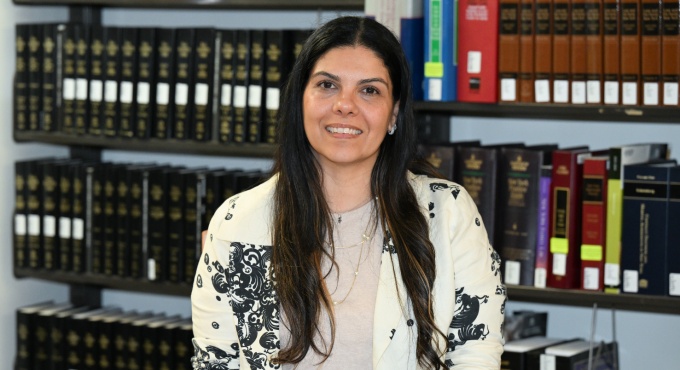
A global perspective on cybersecurity law
The fraught world of cybersecurity, and how to quantify damages when hackers steal personal data, has been the focus of Karla Lellis’ extensive corporate career. It’s an area of expertise she brings to the faculty this year as a lecturer in the law school's BA in Law program.
Lellis is a native of Brazil and earned her JD at Metropolitan University of Santos, near São Paolo. She spent many years doing corporate work in Brazil, specifically contract management and legal compliance. At the same time, she pursued a master of laws degree at Syracuse University College of Law and is now completing her Doctor of Juridical Science degree at Syracuse. (She expects to defend her thesis next year.) She also has completed advanced training in compliance and technology law, privacy law and HIPAA, data protection law, and artificial intelligence policy and regulation.
The field is rapidly evolving, which is what spurred Lellis to come to the U.S. to pursue an LLM. “My goal in coming to the United States was to study how damages are conceptualized, calculated, and enforced in cases involving data breaches,” she says.
“Unlike many countries such as those in the European Union under the GDPR, Brazil with its LGPD, or Canada with their comprehensive privacy statutes, the United States tends to prioritize technology development, with the societal impacts of data breaches often addressed afterward through settlements, or class action lawsuits.”
That’s the theme of her doctoral thesis: how damages are assessed against companies when data breaches occur, comparing the United States and Brazil. When their private data is exposed, Lellis says, consumers suffer more than just inconvenience and financial loss. There are psychological damages as well. She cites the example of a psychologist and professor in Washington, D.C., who was hospitalized for stress after hackers created a pornographic deepfake video of her. “Even if people know it’s completely fake, the damage is too high,” Lellis says.
At UB, Lellis will teach Cybersecurity Law and Common Law in the undergraduate program. “I really like to teach younger people,” she says, “because you can give them the foundation of the law so much more deeply. Undergraduates have much more time to think about how to develop critical thinking as a lawyer. I can work with them and support them in developing critical thinking. And if they come to understand that they don’t want to be a lawyer, they already have the basis of the law. You can give them muscles that can transfer to any other profession.”
Lellis has thought as well about the challenge of engaging the always-online generation, and has some ideas about how to address it. “It is very hard to get students’ attention now,” she says. “They click a button and the whole world comes to them. But I try to understand their personal interests. At the beginning of the semester, I ask them what skills they have—music, art, who they are outside the class. I get very interesting answers. Some people are more visual, some are better at listening. I give each of them the chance to bring something personal to the class.”
So, for example, she might ask a musically talented student to write a piece of music illustrating a concept, or a cartoonist to illustrate it with drawings. “They have to put in a lot of research and time to understand the concept,” she says. “And they really like to see another student presenting something. It keeps their attention.
“What I learned when I was a student was that when the professors cared about us, I loved their class. I really care about my students, and it’s important to me to be sure that they are learning.”